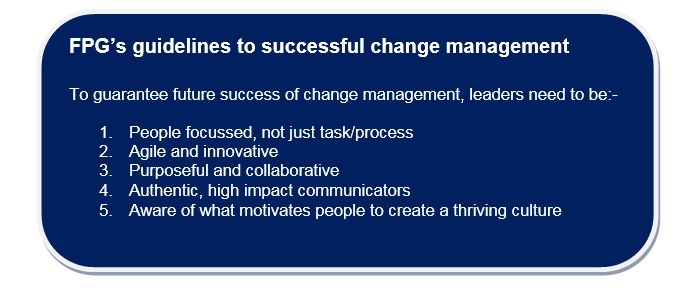Survey shows leaders are getting better at managing change

Most organisations are expecting to make changes as a result of Brexit, however encouragingly, British leaders have revealed they are all set for it. Full Potential Group carried out research, surveying 1,000 senior business leaders on ‘The State of Leadership & Change’ to find out how businesses are coping with anticipated change within their organisations as the UK heads towards an EU exit. Unsurprisingly, 90% anticipate changes within their organisation however, according to our new research, they are taking it in their stride with 42% ‘not worried’ or ‘not at all worried’. The top four expected changes are to source additional markets outside the EU (24%), to restructure and cut costs (21%), to reorganise (16%) and to relocate (16%). It was very promising to see that UK leaders are getting better at managing change (75% of respondents), with only 10% saying they are getting worse. This was proven by the fact that 60% of respondents said that their businesses had met their change objectives in the past five years and only 14% hadn’t. This was a surprise as it’s commonly found that 70% of change initiatives fail to deliver results. It is a sign of greater investment in developing leader’s skills and in measuring change. In terms of what these objectives were, it was very positive to see that they were being measured efficiently and could see real tangible results with 64% saying that productivity improved and 34% saying that profitability had increased as a result of the changes. So what are the factors that drive successful change? 62% of respondents said that over the next 5 years, an organisation and leader’s ability to be agile and responsive within a changing market is the top factor that will affect the success of any change. The other top factors that our respondents think would drive successful change was recruiting people with the right skills (47%) and building leadership capability to take the business through the change (43%). This highlights that it is crucial for leaders to be adaptable and to facilitate change in order to survive and succeed in the long term. Organisations and leaders must be open to new ideas, be more inclusive and collaborate with their teams. In our increasingly disrupted world, nothing stays the same for very long so it is important to be flexible and deal positively with any change. What factors could hinder the success of change initiative? 40% of respondents said that a lack of understanding and communication across the organisation on why these changes are being implemented could result in the change initiatives failing. 28% said that there may be too much emphasis on process and not enough on people and 14% believe that poor motivation and staff morale is a real derailer for change. We have seen a big shift in leadership style in the organisations we work with, moving away from the traditional approach to a more inclusive style that empowers individuals. This research highlights that success is about people, not processes so it is important to involve employees throughout every stage of the initiative. Understanding their individual motivators is imperative so that leaders can assign tasks that really engage and empower them. People need to feel that their efforts are valued and they are contributing to the success of the organisation. Personal ownership and empowerment means greater control which lessens the stress and unease that is often felt during turbulent times, and helps organisations and people become better and more flexible at embracing change.  To download a full copy of the research, please click here.
To download a full copy of the research, please click here.



